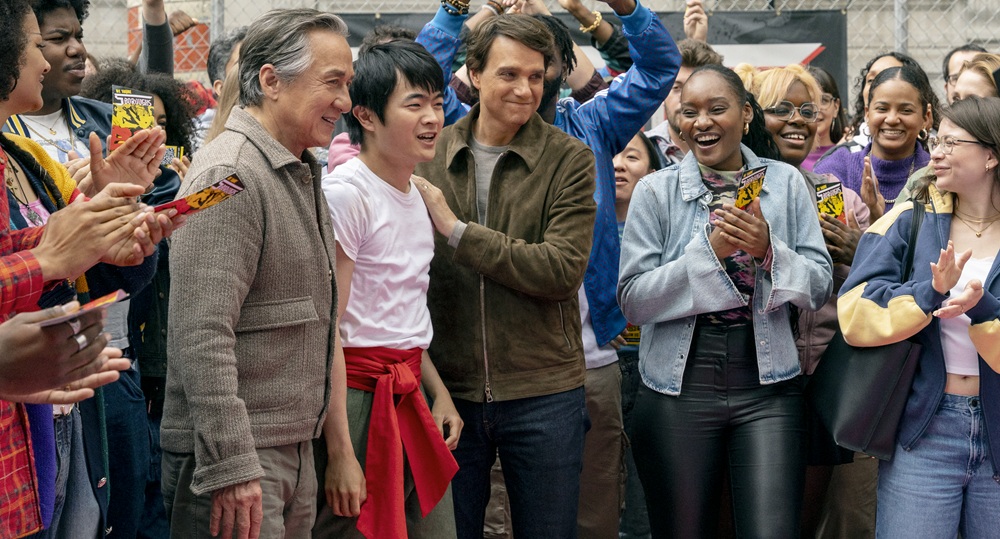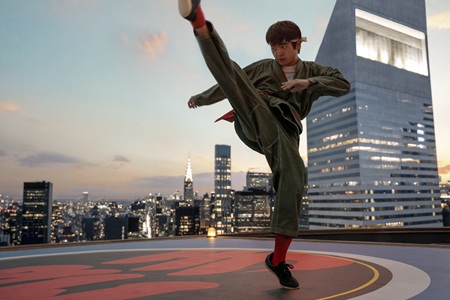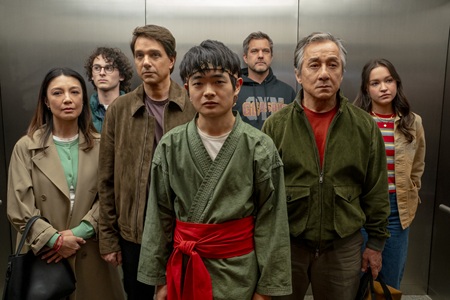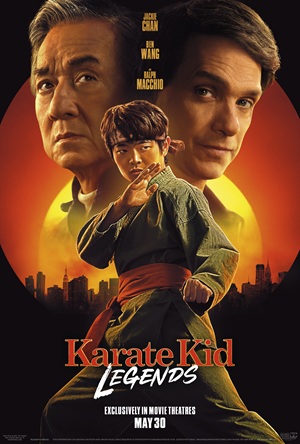
Nothing Legendary About the Latest Installment in the Karate Kid Universe
On the 40th anniversary 4K Ultra-HD release of 1984’s The Karate Kid, there is a lively audio commentary from the creators of the Netflix series Cobra Kai: Josh Heald, Jon Hurwitz, and Hayden Schlossberg. There’s not much in the way of behind-the-scenes or making-of tidbits, they were kids when the film was first released to theaters, but it’s still a loving, reverential, and highly entertaining track nonetheless.
Not only is their unbridled affinity for director John G. Avildsen’s coming-of-age classic obvious, but it’s equally clear they know their stuff. They dissect why certain scenes resonated with them as children and somehow still continue to reverberate with audiences four decades later. The trio dives into all of the characters in minute detail and, understandably, discusses all of the connections to their hit TV show.
But the best bit? Roughly 30 minutes in the group notices how everything that’s transpired up to that point has been all character development, focusing on lead Daniel LaRusso’s (Ralph Macchio) fish-out-water California high school existence and the bullying he’s subjected to by Johnny Lawrence (William Zabka). Heck, Mr. Miyagi (Noriyuki ‘Pat’ Morita) has barely been involved up to this point. As for his vaunted karate skills, they’ve been absent altogether.
I’m paraphrasing, but the group states that no studio in today’s climate, not even the one that made the first The Karate Kid, would allow a family-friendly feature to have such leisurely, plot- and character-focused storytelling. You’d have to see Mr. Miyagi do something amazing early on. There would be a big action sequence within the first 10 minutes. More jokes, more exposition, and far less nuance. As for a two-hour running time that allows the audience time to marinate on Daniel’s situation, doesn’t spell everything out, and leaves certain facets to their imagination? Forget about it. It wouldn’t be allowed to happen.
Ladies and gentlemen, I give you Karate Kid: Legends, which basically is the exact motion picture Heald, Hurwitz, and Schlossberg describe (and deride) in their audio commentary. This is like watching a Karate Kid “greatest hits” compilation, only with one’s finger pressed firmly down on the fast-forward button the entire time. There’s no room for this sixth chapter in the series to breathe, characters are one-dimensional archetypes, and everything has to be explicitly spelled out via unnecessary expository avalanches. This latest installment is a true waste of time. It somehow also makes The Karate Kid Part III and The Next Karate Kid look like Academy Award-winning works of art which, if you’ve seen either of them, already know is far from being the case.
Pity, because this sequel has tons of potential. Newcomer Ben Wang is a find who showcases exceptional emotional dexterity and looks terrific during the drama’s numerous martial arts sequences. The Goldbergs and Cruel Summer star Sadie Stanley makes the leap from the small screen to the big with appealing aplomb, and it’s always nice to see Joshua Jackson get his hands on a role that allows his laidback, teddy bear charisma to shine.
But Jackie Chan, returning as Mr. Han from the 2010 requel starring Jaden Smith? Or the luminous Ming-Na Wen, stuck with a stereotypical demanding-but-loving mother role straight out of the Hollywood cliché archive? Or Macchio, fresh off of his successful six-season run on Cobra Kai? They’re given zero interesting to do, and the only reason it feels like they — or their characters, for that matter — are even around is so that all three can pocket a quick and easy paycheck.
Writer Rob Lieber (Peter Rabbit) has composed a scenario that’s like a 2025 Cliff’s Notes reworking of what original screenwriter Robert Mark Kamen conjured up back in 1984. This time around the relocated newbie is Li Fong (Wang). He’s recently arrived in New York via Beijing after his physician mother (Na Wen) takes a high-profile position at a local hospital. Li makes fast friends with new classmate Mia Lipani (Stanley), who is the ex of psychotic karate impresario Conor (Aramis Knight). Conflict ensues, and with Mr. Han and Daniel LaRusso stepping in as his instructors, the teen decides to participate in a city-wide martial arts tournament where Conor is the defending champion.
Subplots include the death of Li’s older brother Bo (Yankei Ge) a year prior and Mia’s ex-boxer, pizzeria-owning father Victor (Jackson) being in debt to the dangerous loan shark and fight promoter O’Shea (Tim Rozon). The latter gets focused on a little more than the former which, all things considered, struck me as rather strange. Even so, there is some fun to be had in watching Wang and Jackson interact, Li becoming Victor’s impromptu trainer as the out-of-shape former athlete prepares for what he hopes will be a Rocky Balboa-like comeback in the ring.
But this story barely matters. It’s hurried through in one of the film’s several monotonous training montages. It also does not help that the outcome of this subplot is never in doubt. More egregiously, the supposed high stakes to everything that’s happening to Li and his new friends come across as anything but. There is no dramatic depth and little emotive oomph. It’s a paint-by-numbers approach that grows wearingly obnoxious as events progress, and not even a few phenomenally shot martial arts showdowns (kudos to cinematographer Justin Brown) can make any of this tense, exciting, or most of all meaningful.
Because of the rushed nature of the proceedings, Daniel’s presence is pointless, and his attempts to make Mr. Miyagi’s teachings impactful fall infuriatingly flat. This leaves Macchio totally adrift, and it’s telling that his best scenes are his initial interactions with Chan in a familiar California location, and then subsequently an amusing post-credit scene that brought a genuine smile to my face thanks to its easygoing naturalistic charm. Other than that? He’s here to stand around like a mannequin during the never-ending montages and to repeatedly knock Wang to the ground alongside Chan during Li’s tournament training.
Speaking of the Hong Kong legend and international superstar, while I liked Chan quite a bit back in the 2010 film, in this one Mr. Han is something of a slightly misogynistic know-it-all. He basically shows up to tell Li’s mom she’s screwing things up and that he’s better prepared to help her son move on from Bo’s death than she is. It’s his entire character arc, and Mr. Han basically flies from New York to California to enlist LaRussa to assist him in this single-minded mission to prove he’s right and she is wrong.
While that does considerably simplify things, it’s not like Lieber’s script or Jonathan Entwistle’s direction are doing him any favors. Bo’s passing and how the Fong family is dealing (or not dealing) with it seems like the natural focal point for this entry in the franchise. Mr. Han, being Li’s kung fu teacher and a longtime family friend, should unquestionably be a part of their story. But the narrative is so hastily slapped together that there’s no chance for Chan or Na Wen to maneuver. Everything happens with expedited suddenness, and this erases any chance either of their characters could have to come across as authentically three-dimensional.
I could go on, but what’s the point? Heald, Hurwitz, and Schlossberg called it in their commentary track: No major Hollywood studio would allow a film like the original The Karate Kid to be made today. While hardly a shocking statement, it’s still depressing that it was Karate Kid: Legends, of all titles, that can be utilized as a prime example that helps prove them right.
Film Rating: 1 (out of 4)








